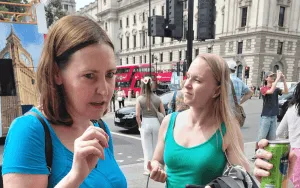
Francesca Martinez was speaking during a debate on the impact of government cuts on disabled people, held in a House of Lords committee room.
The event was organised under the umbrella of The People’s Parliament, a series of discussions held in parliament and hosted by the Labour MP John McDonnell with the aim of “livening up, and providing political depth, to the debate in the run up to the next election”.
Martinez told the packed room on Monday (12 May): “Don’t make us beg. We want to be given the support that is needed but we don’t want to have to crawl on our hands and knees for it.”
Martinez, who was the public face of the WOW petition – which collected more than 100,000 names and forced a debate on disability-related cuts in the House of Commons – said she wanted to challenge the government rhetoric that disabled people were “a group of workshy scroungers”.
She said: “I have never met a disabled person in my life who doesn’t want to work, and those people who can’t work spend their life wishing they could.”
Debbie Domb, who receives support from the Independent Living Fund (ILF), which is due to close in June 2015, described to the meeting – in probably the most powerful of the speeches – how she expected that closure to impact on her life.
She has a progressive, degenerative neurological condition and currently receives support 24-hours-a-day from personal assistants she has recruited and trained herself, but said: “I am very, very scared about my future if the ILF is abolished next year.
“Without ILF, I will be left with a stark choice: to either go in an institution, joining the thousands of other disabled people already incarcerated, or receive a few hours of agency ‘care’ a week.
“These both contravene my human right to choice of where, and who, I live with. The second option would be about basic survival.”
She added: “Dealing with the consequences on my mental and physical health without ILF will be hugely expensive for the NHS.”
She said ILF had enabled her to live in her own home, attend her son’s wedding, go on holiday, be a founder member of a disabled people’s campaign group, meet with friends, rehome two cats, and attend adult education classes.
But without ILF, she would have “no life”, and if there was a fire in her home she would be unable to escape. She would, she said, “be existing in limbo with no quality of life”.
Ian Jones, one of the founders of the WOW campaign, said: “I have listened to people today and it is quite clear that we do not have any framework in this country for how we are to be treated.”
He called for a bill of rights for disabled people that would describe their rights, the opportunities they should have, and how they should be treated.
Tracey Lazard, chief executive of Inclusion London, said disabled people were facing “systematic and unprecedented” attacks from the government that were “literally killing thousands of disabled people” and “pushing even more of us into poverty, isolation and despair”.
She said: “Everything that disabled people and our allies have fought for over the last 30 years is at risk.”
She spoke about the manifesto published last September by the Reclaiming Our Futures Alliance, which lays out key principles, demands and commitments that disabled people, their organisations and allies can use in campaigning and lobbying in the run-up to the 2015 general election.
Lazard added: “I really cannot believe the current government’s strategy is called Fulfilling Our Potential. If it was truthful, it would be called Killing Our Potential.”
She said society had to “stop seeing support for disabled people as dead money, a drain on resources that needs to be eliminated”, and see it instead as essential investment.
Linda Burnip, one of the founders of Disabled People Against Cuts, spoke about the group’s origins and the impact of the cuts on disabled people.
She said: “Increasing numbers of people are being forced to choose between eating and heating their homes.
“Many disabled people live in constant fear that they will end up living without adequate support.
“They fear they will become prisoners in their own homes or forced into residential homes.”
Micheline Mason, a veteran disabled activist, said it was vital to “get back the language of empathy and humanity and start using it all the time”.
She compared the current atmosphere that was “turning us against each other” with the climate of fear that developed under Nazi rule in 1930s Germany.
She said: “It’s very dangerous if it isn’t stopped because it happened before and we know where it led.”
14 May 2014

 Disabled MP who quit government over benefit cuts tells DNS: ‘The consequences will be devastating’
Disabled MP who quit government over benefit cuts tells DNS: ‘The consequences will be devastating’ Minister finally admits that working-age benefits spending is stable, despite months of ‘spiralling’ claims
Minister finally admits that working-age benefits spending is stable, despite months of ‘spiralling’ claims Timms says cuts must go ahead, despite being reminded of risk that disabled claimants could die
Timms says cuts must go ahead, despite being reminded of risk that disabled claimants could die